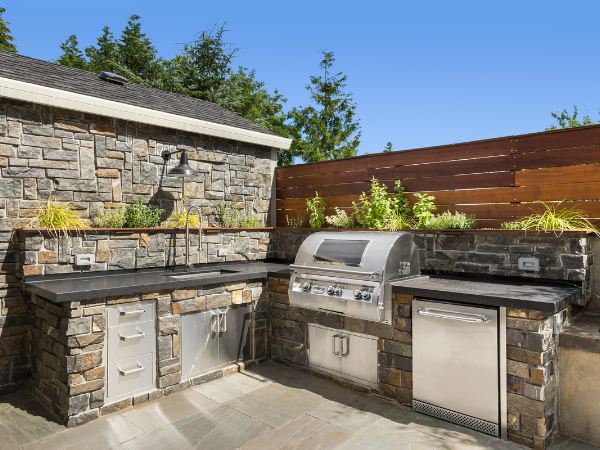
Quartz is an excellent choice for outdoor kitchen countertops as long as you follow a few guidelines. There are some alternatives if you decide quartz isn’t the way to go. Consider the following when creating your ideal outdoor setting.
Benefits of Using Quartz Countertops Outdoors
Quartz is famously durable, measurably surpassing other common kitchen materials like granite and marble. There are two areas where this durability particularly comes into play.
The first is that quartz is nonporous. This means that liquids like rain won’t enter the quartz, protecting it from damage from regular morning dampness, rain, snow, and other potential threats.
This nature also helps limit staining and prevents most bacteria growth, though you should still clean the countertop before using it. Fortunately, cleaning outdoor kitchen countertops made of quartz is as easy as using soap and a little bit of warm water. Quartz countertops require almost no maintenance, either, which makes them an outstanding choice for outdoor kitchens that don’t see much use.
Limits of Using Quartz Countertops Outdoors
Quartz is famously durable, measurably surpassing other common kitchen materials like granite and marble. There are two areas where this durability particularly comes into play.
The first is that quartz is nonporous. This means that liquids like rain won’t enter the quartz, protecting it from damage from regular morning dampness, rain, snow, and other potential threats.
This nature also helps limit staining and prevents most bacteria growth, though you should still clean the countertop before using it. Fortunately, cleaning outdoor kitchen countertops made of quartz is as easy as using soap and a little bit of warm water. Quartz countertops require almost no maintenance, either, which makes them an outstanding choice for outdoor kitchens that don’t see much use.
Are There Any Alternatives to Quartz?
There are a few alternatives to quartz if you want an outdoor countertop. The first choice for most people is granite, which is also quite durable. Granite works exceptionally well in hotter environments that quartz has trouble with, especially if you can keep infrequent rainstorms off of it.
The main drawback of granite is that it’s somewhat porous, which means it’s vulnerable to water damage. This is why it’s a decent choice for dry areas that don’t see a lot of daily moisture but not a good choice in wetter and colder areas.
Soapstone isn’t as popular as granite or quartz, mainly because it isn’t quite as durable as they are. However, it’s nonporous like quartz, and it’s also generally good at holding up to acidic foods. Unfortunately, it’s relatively expensive, too.
Concrete is a reasonably tough material as long as you reinforce it with tensile steel or similar materials. However, it’s also somewhat prone to cracking if you don’t install it just right, so it’s not as durable as quartz.
The cheapest option is tile, which you can put over concrete, stone, or almost any other material you want to make an outdoor kitchen with. Tile is cheap, but it’s not nearly as durable as granite or quartz for outdoor kitchen countertops, so you may end up spending a lot of money over time on repairs.
The Color Factor
One final thing to consider about outdoor kitchen countertops is the color. Darker hues absorb more light, which means they get hotter much faster than pale alternatives. Lighter countertops for outdoor kitchens are better in most parts of the country, although some northern areas may prefer countertops dark enough to stay a bit warmer during the coldest parts of the year.
